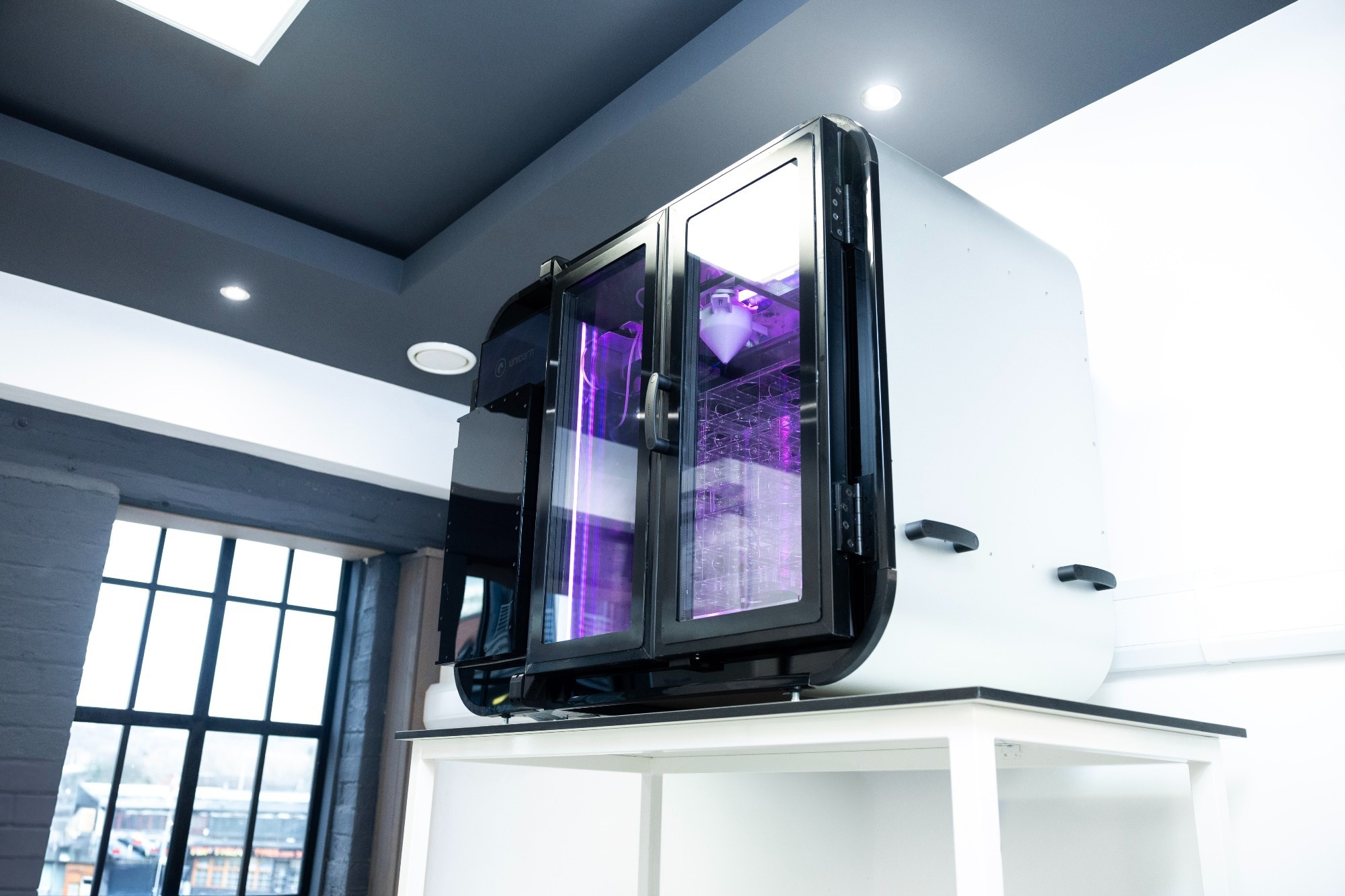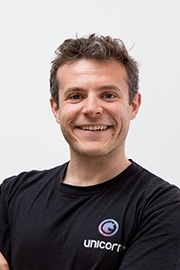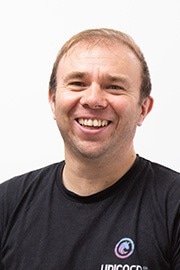To start off, could you introduce yourselves and Unicorn Biotechnologies?
Jack: I’m Jack, one of the co-founders of Unicorn Biotechnologies. My background is in chemistry, and I’ve worked across academia, industry, and startups. I really enjoy working at the intersection of science and engineering - turning lab-based science into real-world solutions. Adam and I met during the pandemic on Zoom, and we actually started the company before ever meeting in person.
Adam: I did my PhD in cancer research over 15 years ago, then moved into stem cell research and tissue engineering. After a stint in big industry, I realized innovation thrives more in startups. I got into hardware engineering because I couldn’t believe how much of cell culture was still manual. That’s where Unicorn came in - we’re trying to automate those laborious processes and bring reproducibility to cell culture, which has been a challenge for decades.
Where did the name “Unicorn Biotechnologies” come from?
Adam: There are two true stories. First, unicorn companies are startups valued over a billion dollars, so it’s a cheeky goal. Second, we had 15 minutes to register a company name and found Unicorn Biotechnologies was available. Also, the unicorn is the national animal of Scotland, where I’m from, and my son - who helped with our early lab work during lockdown - loved the name. He still calls it “Daddy’s company” every time he sees a unicorn in a store.
Emmet is described as a fully integrated, benchtop cell culture automation system - what sets it apart from other solutions currently on the market?
Jack: Automating cell culture isn’t a new idea, but previous systems have three major drawbacks - they’re huge, expensive, and not always reproducible. Some are the size of multiple Volkswagens and cost seven figures. They're also typically built from repurposed lab automation hardware, which leads to variability. With Emmet, we built a purpose-designed system that integrates everything into a compact benchtop device. It’s more reproducible, more affordable, and more accessible for everyday labs.

The Emmet System. Image Credits: Unicorn Biotechnologies
Walk us through a typical user workflow with Emmet. How does a scientist or user design a cell culture protocol and set up the instrument?
Adam: Our software is designed with scientists in mind. Many companies bolt on software at the end, but for us, the software and hardware were co-designed. Users can input their standard operating procedures - like seeding, passaging, or differentiating cells - and customize fluid flow, rocking frequency, and other parameters. Setup is super intuitive, like using a capsule-based espresso machine. In the future, we want Emmet to incorporate feedback loops and real-time decision-making, removing the variability of human input altogether.
Modularity and scalability are key trends in automation - how does Emmet support labs that want to scale operations or adapt to evolving experimental needs?
Jack: Emmet is modular and flexible both internally and externally. Internally, users can change hardware and software settings quickly. For example, switching from six to twelve T-flasks can be done in minutes. Externally, the system fits on any standard lab bench. To scale, labs can simply add more Emmet units without having to reengineer their process, making tech transfer and scaling much simpler.
Reliability and uptime are crucial in high-throughput environments. What features or engineering decisions ensure Emmet delivers consistent performance under continuous use?
Adam: We prioritize quality control and reproducibility. We use onboard imaging and sensing systems for pH, glucose, and lactate. We're also developing biochemical fingerprinting tools. Instead of subjective decisions like “it looks 80% confluent,” we generate real data to guide actions. This standardizes processes and reduces the artisan-like variability that still exists in many labs.
What kinds of use cases or application areas have you seen the most interest in for Emmet - screening campaigns, toxicology studies, regenerative medicine development, something else?
Jack: All of the above. Most labs, even high-tech ones, still do cell culture manually. We validated Emmet with sensitive pluripotent stem cells, and if it can handle those, it can handle almost any mammalian cell line - from iPSCs to cancer cell lines to HEK cells for viral vector production.
Looking ahead, how do you envision Emmet evolving - are there plans to expand its capabilities or integrate more AI/ML-driven functionality for decision-making?
Adam: Absolutely. We already use imaging and machine learning to monitor confluence and identify cell types. The next step is predictive analytics - giving Emmet a target outcome and letting it figure out the protocol. We’re experimenting with LLMs like ChatGPT to design experiments automatically. It’s like building a discovery engine.
Jack: (laughs) Just to clarify - we’re not in a partnership with OpenAI… but we’d love to be!
How has the response been at SLAS 2025 so far? Are there any recurring questions or surprising feedback you’ve received from attendees?
Jack: It was amazing. From the moment the exhibition opened to the minute it closed, we had constant interest. Most of it was organic - people saw our talk or were drawn in by our stuffed unicorns - and we had deep, meaningful conversations with folks who really need what we’re offering.
SLAS is known for fostering collaboration and innovation. Have there been any exciting partnership discussions or new opportunities sparked during the exhibition?
Jack: Yes, we had great conversations with people in our ideal customer profile - scientists dealing with manual cell culture issues who want a better solution. They see real business value in Emmet - less FTE time, better consistency, and fewer delays due to human scheduling.
What do you personally enjoy most about being part of SLAS, and how does it contribute to Unicorn’s innovation journey?
Jack: The best part? Definitely the stuffed unicorns! But seriously, in-person conversations are invaluable. We learned more and had more productive commercial interactions in two days at SLAS than we would from months of email outreach. It’s that spontaneous hallway magic - you can’t beat it.
Finally, what’s next for Unicorn Biotechnologies?
Jack: We’re scaling up deployments - already in the UK, with US and EU expansions coming soon. Beyond Emmet, we have other R&D products in the pipeline, including GMP-ready versions and smaller-scale systems for early discovery.
Adam: We want Emmet systems to be as common as PCR machines - helping researchers across cancer, stem cells, vaccines, and beyond. It’s about creating an outsized impact across all of science.
Where can readers find more information?
Emmet: https://www.unicornb.io/machines/emmet
Unicorn Biotechnologies' LinkedIn: https://www.linkedin.com/company/unicorn-biotechnologies/
About the Speakers
Jack Reid holds a degree in Chemistry and has worked across academic and commercial R&D settings before co-founding Unicorn Biotechnologies. His experience spans multinational corporations and agile startups, with a passion for translating science into scalable technologies. His leadership focuses on product innovation, user-centric design, and startup ecosystem development.
translating science into scalable technologies. His leadership focuses on product innovation, user-centric design, and startup ecosystem development.
Dr. Adam Glen earned his PhD in cancer research and has worked across academia, big industry (GE Healthcare), and biotech startups. He has developed expertise in stem cell biology, tissue engineering, and hardware integration for life science applications. Adam co-founded Unicorn Biotechnologies with a mission to automate and simplify cell culture workflows, inspired by his firsthand experience with the inefficiencies of manual lab work.
integration for life science applications. Adam co-founded Unicorn Biotechnologies with a mission to automate and simplify cell culture workflows, inspired by his firsthand experience with the inefficiencies of manual lab work.